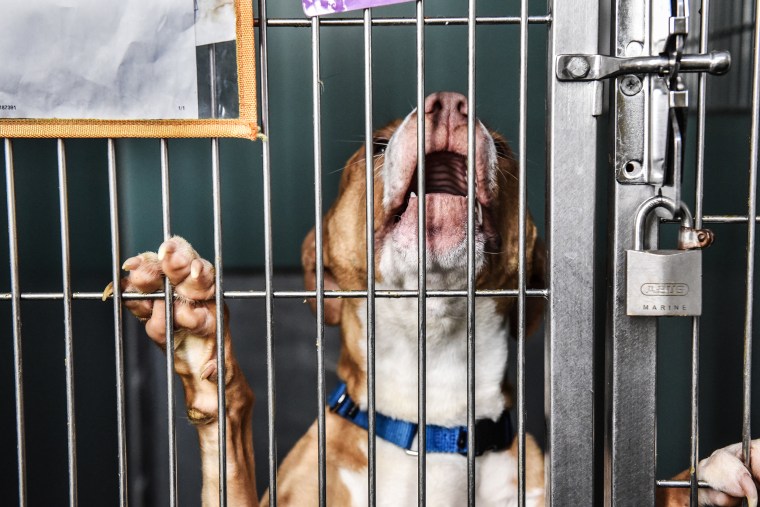New York City’s largest animal shelter hit a sad milestone.
Rocky, an 11-year-old senior dog surrendered by his owner, became the 1,000th animal at the Animal Care Centers of New York City, which announced on July 18 that its three shelters stopped accepting dogs, cats, bunnies and other critters, except in emergencies.
The graying pup stood in a cage in a peaceful side office inside the Brooklyn location — VIP treatment considering hundreds of other dogs at the shelter were in tight quarters that were never intended to be overflowing.
“We’re in the business to care for animals that come to us, and we want to help people with their pets, but when we have 1,000 animals to care for and a capacity to house them that doesn’t meet that need, we’re in a bit of a difficult situation,” ACC President and CEO Risa Weinstock told NBC News.
Even with the shelter practically bursting at the seams, the staff made exceptions. Weinstock said after they made the announcement to suspend intakes, 200 animals were accepted into their shelters that were either a public safety risk or sent by city agencies. The situation is so dire that New York City stepped in Friday with $1 million to help ACC.
“But we are asking the public to work with us to slow down what is coming in,” Weinstock said.
As the cost of living and pet care rises, animal shelters across the country are at critical capacity dealing with an influx of surrendered pets, oftentimes due to the price tag associated with their care. An estimated 5.8 million animals filled up facilities last year, according to the nonprofit Shelter Animals Count’s national database.
While there was a 1% decrease in shelter intakes from 2023 to 2024, the levels remain high. In 2019, 55% of shelter dogs had “live outcomes,” meaning they were adopted or returned to their owner. That number dropped to 50% in 2024, with an estimated 334,000 canines being euthanized.

“It’s been a tough several years for animal shelters,” said Tori Fugate, the group’s communications director.
In Arizona, animal shelter operators are finding pets abandoned in parking lots or on the side of the road. In Virginia, an over-capacity shelter has taken to social media to call for adoptions urgently. And in Tennessee, one shelter said it is “drowning” in rescue dogs, forced to stack kennels on top of each other to provide space.
The rise in the cost of living and a shortage of affordable housing are forcing many pet owners in America into tough circumstances, according to Fugate.
The price of pet care has risen dramatically. A Bank of America Institute report found that since 2019, prices of services like veterinary care and grooming have gone up 42%, with the cost of goods like food and treats surging 22%. Pet insurance is expensive, too.
That has led pet owners to pull back on pet-related transactions: Card spending at pet stores dropped by 4% from April 2024 to this April, while spending at vets dropped 1% during the same period.
“The main reason for pet surrender is, ‘I can’t afford it.’ Vet care is expensive, food is expensive, I mean, just human cost of living is expensive,” Weinstock said.
Shelters are working to provide new resources to persuade pet owners to reconsider or delay surrendering their pets. The ACC in New York provides free food, vaccine clinics and veterinarian vouchers — “anything we can do to help you keep your pet,” Weinstock said.
“Even if it’s just one animal, one person’s dog, who we said, ‘If we give you food for a month and you can pay your electricity, would that help you take your dog or your cat or your rabbit home?’ and they say yes, and they walk off with their kids and they’re crying because we were able to keep that pet with them, that’s a good day,” she added.
Shelter Animals Count also found that the timeline for animals in these facilities is changing.
“The length of stay, so the time that animals are spending in the shelter, is increasing year over year,” Fugate told NBC News.
“We can have a dog stay here, a cat, a guinea pig, a rabbit, could be three days, and it could be over a year,” Weinstock said.
Weinstock said euthanasia remains the “last, last, last choice.”
“Our goal is if there’s nothing wrong with them behaviorally or medically, and they’re not a safety risk, they’re going to stay here, and we’re going to market them every chance we get,” she said.
The solution to reduce the overpopulation of returned animals isn’t an easy one. Weinstock said it requires the community to step up and foster pets — but also government resources to address the root causes of pets being surrendered.
On Friday, New York Mayor Eric Adams announced the city would be investing $1 million into the ACC.
“In so many ways, our pets care for us and our loved ones, and it’s important that we care for them, too,” Adams said in a news release.
The mayor, who is up for re-election this year, encouraged New Yorkers to adopt from the ACC and said the funding is intended to hire 14 more staff members for their locations and help with their day-to-day needs.
For those who want to help, “people could foster, people could donate, they could volunteer, they can network, they can amplify our message,” Weinstock said. But she added that her team is meant to be a resource to the community during hard times, not a solution to the larger issues at hand.
“People who bring their animals are out of options,” Weinstock said. “They’re not out of compassion.”


